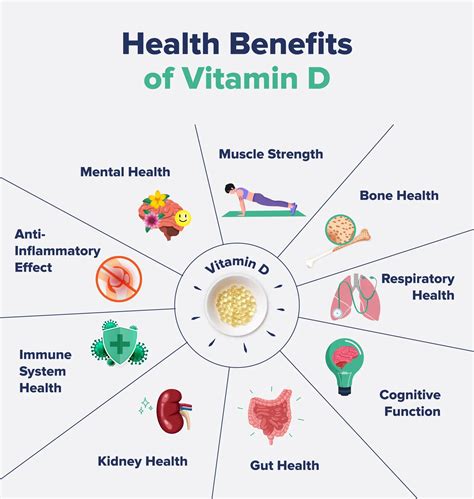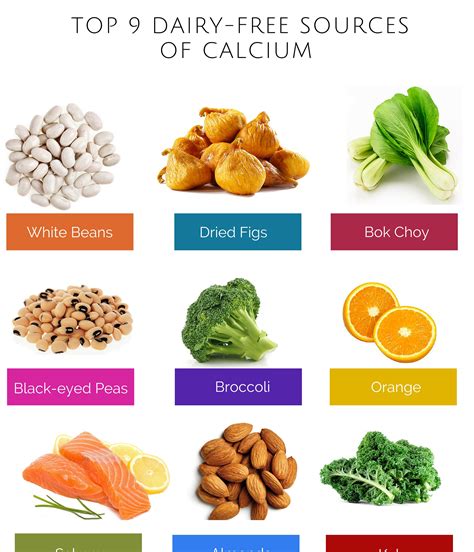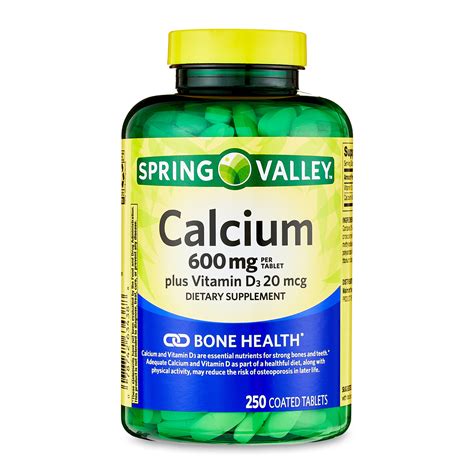Intro
Boost bone health with Calcium and Vitamin D benefits, enhancing absorption, strengthening bones, and supporting immune function, muscle health, and overall wellness.
Calcium and vitamin D are two essential nutrients that play a crucial role in maintaining strong bones, teeth, and overall health. Calcium is the most abundant mineral in the human body, and it is necessary for building and maintaining bone density. Vitamin D, on the other hand, is a fat-soluble vitamin that helps the body absorb calcium and maintain bone health. When taken together, calcium and vitamin D can provide numerous benefits for the body. In this article, we will delve into the importance of calcium and vitamin D, their benefits, and how they can be incorporated into a healthy lifestyle.
The combination of calcium and vitamin D is particularly important for individuals who are at risk of osteoporosis, a condition characterized by brittle and porous bones. Osteoporosis can lead to an increased risk of fractures, which can be debilitating and even life-threatening. By taking calcium and vitamin D supplements, individuals can help maintain strong bones and reduce their risk of osteoporosis. Additionally, calcium and vitamin D have been shown to have numerous other benefits, including reducing the risk of certain diseases and improving overall health.
Calcium and vitamin D are also essential for maintaining healthy teeth and gums. Calcium helps to strengthen tooth enamel, while vitamin D helps to regulate the amount of calcium in the blood. This can help to prevent conditions such as tooth decay and gum disease. Furthermore, calcium and vitamin D have been shown to have a positive impact on muscle function and nerve function, making them essential for overall health and well-being. With so many benefits, it's no wonder that calcium and vitamin D are often referred to as the "dynamic duo" of nutrients.
Benefits of Calcium and Vitamin D

The benefits of calcium and vitamin D are numerous and well-documented. Some of the most significant benefits include:
- Bone health: Calcium and vitamin D are essential for building and maintaining strong bones. They help to regulate bone density, reducing the risk of osteoporosis and fractures.
- Tooth health: Calcium helps to strengthen tooth enamel, while vitamin D helps to regulate the amount of calcium in the blood. This can help to prevent conditions such as tooth decay and gum disease.
- Muscle function: Calcium and vitamin D are necessary for muscle function and contraction. They help to regulate muscle cramps, spasms, and weakness.
- Nerve function: Calcium and vitamin D are essential for nerve function and transmission. They help to regulate nerve impulses, reducing the risk of conditions such as numbness, tingling, and muscle weakness.
- Immune system: Vitamin D has been shown to have a positive impact on the immune system, reducing the risk of certain diseases and infections.
How Calcium and Vitamin D Work Together
Calcium and vitamin D work together to maintain strong bones and overall health. Calcium is absorbed into the bloodstream, where it is then transported to the bones. Vitamin D helps to regulate the amount of calcium in the blood, ensuring that it is absorbed into the bones. This process helps to maintain strong bones and reduce the risk of osteoporosis.Food Sources of Calcium and Vitamin D

Calcium and vitamin D can be found in a variety of food sources. Some of the richest sources of calcium include:
- Dairy products: Milk, cheese, yogurt, and other dairy products are rich in calcium.
- Leafy greens: Leafy greens such as kale, broccoli, and spinach are rich in calcium.
- Fortified foods: Many foods, such as orange juice and cereals, are fortified with calcium.
- Nuts and seeds: Almonds, sesame seeds, and other nuts and seeds are rich in calcium.
Vitamin D can be found in:
- Fatty fish: Fatty fish such as salmon, mackerel, and sardines are rich in vitamin D.
- Fortified foods: Many foods, such as milk and cereals, are fortified with vitamin D.
- Mushrooms: Some mushrooms, such as shiitake and portobello, are rich in vitamin D.
- Sunlight: Vitamin D can also be produced in the skin upon exposure to sunlight.
Calcium and Vitamin D Deficiency
A deficiency in calcium and vitamin D can lead to a range of health problems. Some of the most common symptoms of a calcium deficiency include:- Muscle cramps: Calcium is necessary for muscle function and contraction. A deficiency can lead to muscle cramps, spasms, and weakness.
- Weakened bones: Calcium is essential for building and maintaining strong bones. A deficiency can lead to weakened bones, osteoporosis, and an increased risk of fractures.
- Tooth decay: Calcium helps to strengthen tooth enamel. A deficiency can lead to tooth decay and gum disease.
A deficiency in vitamin D can lead to:
- Osteoporosis: Vitamin D is essential for maintaining strong bones. A deficiency can lead to osteoporosis and an increased risk of fractures.
- Weakened immune system: Vitamin D has been shown to have a positive impact on the immune system. A deficiency can lead to a weakened immune system and an increased risk of certain diseases and infections.
- Depression: Vitamin D has been shown to have a positive impact on mood. A deficiency can lead to depression, anxiety, and other mental health problems.
Calcium and Vitamin D Supplements

Calcium and vitamin D supplements can be an effective way to ensure adequate intake of these essential nutrients. There are many different types of calcium and vitamin D supplements available, including:
- Calcium carbonate: Calcium carbonate is a common form of calcium supplement. It is often taken in the form of tablets or capsules.
- Calcium citrate: Calcium citrate is another form of calcium supplement. It is often taken in the form of tablets or capsules.
- Vitamin D2: Vitamin D2 is a form of vitamin D supplement. It is often taken in the form of tablets or capsules.
- Vitamin D3: Vitamin D3 is another form of vitamin D supplement. It is often taken in the form of tablets or capsules.
When choosing a calcium and vitamin D supplement, it's essential to consider the following factors:
- Type of calcium: There are many different types of calcium supplements available. Calcium carbonate and calcium citrate are two of the most common forms.
- Type of vitamin D: There are two main forms of vitamin D supplements: vitamin D2 and vitamin D3.
- Dosage: The recommended dosage of calcium and vitamin D supplements can vary depending on age, sex, and other factors.
- Brand reputation: It's essential to choose a reputable brand that uses high-quality ingredients and has a good manufacturing process.
Interactions and Side Effects
Calcium and vitamin D supplements can interact with certain medications and have side effects. Some of the most common interactions and side effects include:- Interactions with medications: Calcium and vitamin D supplements can interact with certain medications, such as blood thinners and certain antibiotics.
- Gastrointestinal side effects: Calcium and vitamin D supplements can cause gastrointestinal side effects, such as constipation, diarrhea, and stomach cramps.
- Allergic reactions: Some individuals may be allergic to calcium and vitamin D supplements. Symptoms of an allergic reaction can include hives, itching, and difficulty breathing.
Conclusion and Recommendations

In conclusion, calcium and vitamin D are two essential nutrients that play a crucial role in maintaining strong bones, teeth, and overall health. The benefits of calcium and vitamin D are numerous and well-documented, and they can be found in a variety of food sources. Calcium and vitamin D supplements can be an effective way to ensure adequate intake of these essential nutrients. However, it's essential to consider the type of calcium and vitamin D, dosage, and brand reputation when choosing a supplement. Additionally, individuals should be aware of potential interactions and side effects.
We recommend that individuals consult with their healthcare provider before taking any supplements. A healthcare provider can help determine the best course of treatment and recommend a high-quality supplement. Additionally, individuals can incorporate calcium and vitamin D-rich foods into their diet, such as dairy products, leafy greens, and fatty fish.
What are the benefits of taking calcium and vitamin D supplements?
+Calcium and vitamin D supplements can help maintain strong bones, reduce the risk of osteoporosis and fractures, and improve overall health.
What are the best food sources of calcium and vitamin D?
+Calcium can be found in dairy products, leafy greens, and fortified foods. Vitamin D can be found in fatty fish, fortified foods, and sunlight.
Can calcium and vitamin D supplements interact with medications?
+Yes, calcium and vitamin D supplements can interact with certain medications, such as blood thinners and certain antibiotics. Individuals should consult with their healthcare provider before taking any supplements.
We hope this article has provided you with a comprehensive understanding of the benefits and importance of calcium and vitamin D. If you have any further questions or concerns, please don't hesitate to comment below. Share this article with your friends and family to help spread awareness about the importance of calcium and vitamin D. Take the first step towards maintaining strong bones and overall health by incorporating calcium and vitamin D-rich foods into your diet and considering supplements.
